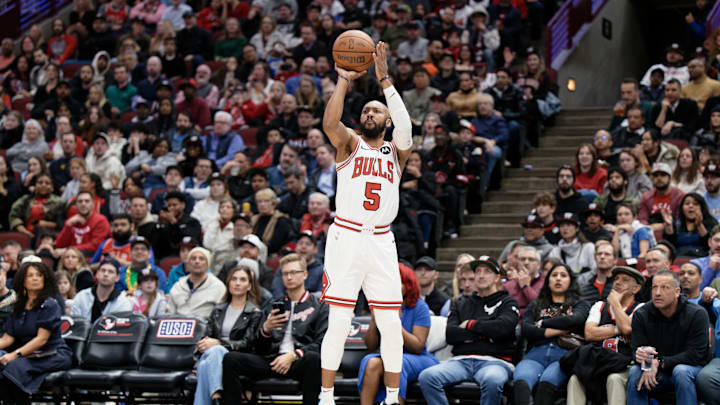Entering the 2025-26 regular season, the Chicago Bulls roster will feature 13 players aged 25 or younger, reflecting the front office’s philosophy of “youth with experience.” The team appears committed to giving its young prospects expanded roles, yet they continue to rely on established veterans brought in years ago to compete for a playoff spot alongside All-Stars DeMar DeRozan and Zach LaVine.
This year, finding the right balance between development and immediate competitiveness will be crucial as Chicago looks to rise above play-in contention and re-establish itself as a consistent playoff team.
Amid this mix of young prospects and seasoned veterans, one player stands out as a guiding presence in the backcourt. Known for his defensive tenacity and career 37.9% percent shooter from beyond the arc, Jevon Carter enters his third season in a Bulls uniform and eighth season in the NBA overall. However, he now faces a slightly different role than what was previously expected, one that will test both his adaptability and his impact on a developing roster.
Carter's reduced role last season
Throughout the 2024-25 season, Carter’s role in Chicago took a noticeable step back compared to previous years. After establishing himself as a key defensive stopper throughout his first six seasons, his minutes were nearly cut in half from his career average. Appearing in a career-low 36 games, this reduced opportunity naturally led to a decline in statistical production.
Despite limited opportunity, Carter remained a decently reliable presence on the floor. His defensive instincts and perimeter shooting continued to provide value, particularly when Lonzo Ball was sidelined with injury. Beginning the transition into a smaller role last season may serve him well as he prepares to adapt to the evolving needs of a younger, developing team.
Value beyond the stats
Even if Carter’s stats don’t jump off the page, his value to the 2025-26 roster extends far beyond the box score. As the second-oldest player on the team, his presence and guidance in the locker room position him as both a mentor and an on-court coach. His near-decade-long NBA tenure allows him to make subtle contributions that elevate the young players around him.
If he finds his way into meaningful game action, his reliability as a 3-and-D guard creates the spacing needed for younger guards to flourish. Additionally, his experience gives the coaching staff confidence to trust him in high-pressure, late-game situations when the younger players may not yet be ready. In this way, Carter’s intangibles may prove more impactful than any single stat line.
As Chicago moves forward in this retool, the front office's ability to balance youth alongside veteran experience will define this team's trajectory. While Carter will most certainly not receive the same game action as the younger guards, his contributions in the locker room could be the difference that turns potential into sustained success, helping the team transition from a developing squad into a true playoff contender.
